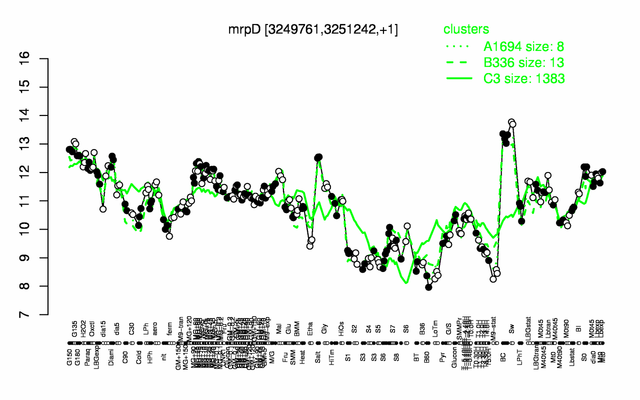Difference between revisions of "MrpD"
| Line 61: | Line 61: | ||
=== Database entries === | === Database entries === | ||
| + | * '''BsubCyc:''' [http://bsubcyc.org/BSUB/NEW-IMAGE?type=NIL&object=BSU31630&redirect=T BSU31630] | ||
* '''DBTBS entry:''' [http://dbtbs.hgc.jp/COG/prom/mrpABCDEFG.html] | * '''DBTBS entry:''' [http://dbtbs.hgc.jp/COG/prom/mrpABCDEFG.html] | ||
| Line 99: | Line 100: | ||
=== Database entries === | === Database entries === | ||
| + | * '''BsubCyc:''' [http://bsubcyc.org/BSUB/NEW-IMAGE?type=NIL&object=BSU31630&redirect=T BSU31630] | ||
* '''Structure:''' | * '''Structure:''' | ||
Revision as of 14:38, 2 April 2014
- Description: H+ transporter subunit of the Na+/H+ antiporter, multiple resistance and pH homeostasis
| Gene name | mrpD |
| Synonyms | yufD |
| Essential | yes PubMed |
| Product | Na+/H+ antiporter subunit |
| Function | sodium export |
| Gene expression levels in SubtiExpress: mrpD | |
| Interactions involving this protein in SubtInteract: MrpD | |
| MW, pI | 53 kDa, 9.488 |
| Gene length, protein length | 1479 bp, 493 aa |
| Immediate neighbours | mrpC, mrpE |
| Sequences | Protein DNA DNA_with_flanks |
Genetic context 
This image was kindly provided by SubtiList
| |
Expression at a glance PubMed
| |
Contents
Categories containing this gene/protein
transporters/ other, metal ion homeostasis (K, Na, Ca, Mg), essential genes, membrane proteins
This gene is a member of the following regulons
The gene
Basic information
- Locus tag: BSU31630
Phenotypes of a mutant
Database entries
- BsubCyc: BSU31630
- DBTBS entry: [1]
- SubtiList entry: [2]
Additional information
The protein
Basic information/ Evolution
- Catalyzed reaction/ biological activity: H+ transporter subunit of the Na+/H+ antiporter PubMed
- Protein family:
- Paralogous protein(s):
Extended information on the protein
- Kinetic information:
- Modification:
- Effectors of protein activity:
- Localization: cell membrane (according to Swiss-Prot)
Database entries
- BsubCyc: BSU31630
- Structure:
- UniProt: O05229
- KEGG entry: [3]
- E.C. number:
Additional information
Expression and regulation
- Regulation:
- Regulatory mechanism:
- Additional information:
Biological materials
- Mutant:
- Expression vector:
- lacZ fusion:
- GFP fusion:
- two-hybrid system:
- Antibody:
Labs working on this gene/protein
Your additional remarks
References